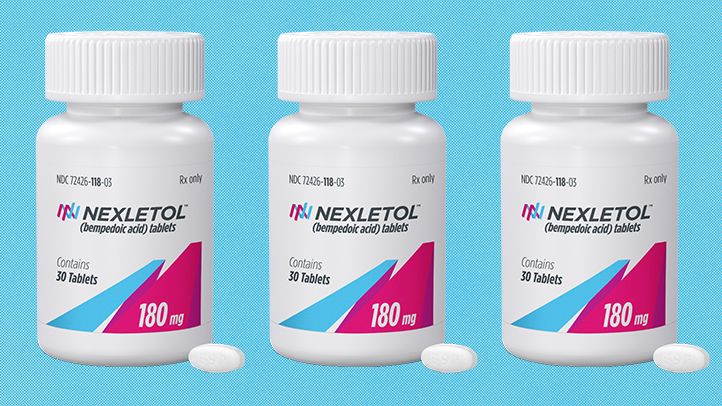Introduction
In the world of medicine, one size does not fit all. The concept of personalized medicine has gained prominence, recognizing that each patient is unique, and healthcare should be tailored to individual characteristics. This approach holds true for statin therapy, a cornerstone in cholesterol management. In this article, we explore the power of personalized medicine and how tailoring statin therapy to individual patients can lead to better outcomes and improved cardiovascular health.
In the world of medicine, one size does not fit all. The concept of personalized medicine has gained prominence, recognizing that each patient is unique, and healthcare should be tailored to individual characteristics. This approach holds true for statin therapy, a cornerstone in cholesterol management. In this article, we explore the power of personalized medicine and how tailoring statin therapy to individual patients can lead to better outcomes and improved cardiovascular health.
Personalized medicine, also known as precision medicine, is a revolutionary shift in the way we approach healthcare. It acknowledges that genetic makeup, lifestyle choices, and even environmental factors can influence an individual’s response to medications. Statins, a class of drugs widely prescribed to lower cholesterol levels and reduce cardiovascular risk, exemplify the importance of customization in medical treatment.
Consider two patients with high cholesterol levels. On paper, their cholesterol numbers may appear similar, but beneath the surface, their health profiles may differ significantly. One patient might have a strong family history of heart disease, while the other may have a history of muscle-related side effects from previous statin use. These differences necessitate a personalized approach to statin therapy.
For the first patient, starting statin therapy early and aggressively may be the best course of action to prevent future cardiovascular events. However, for the second patient, alternative strategies like lifestyle modifications or different medications may be considered to manage cholesterol effectively while minimizing side effects.
Personalized statin therapy involves a comprehensive assessment of various factors, including genetics, age, gender, cholesterol levels, family history, and previous medication experiences. Genetic testing, in particular, can offer valuable insights into how an individual metabolizes medications, allowing healthcare providers to select the most suitable statin and dosage for a patient’s unique genetic profile.
Furthermore, personalized medicine extends beyond statin selection. It also considers the patient’s lifestyle, including diet, exercise habits, and overall health goals. By taking these factors into account, healthcare providers can create a tailored plan that not only addresses cholesterol levels but also promotes long-term cardiovascular health.
In conclusion, the era of personalized medicine is transforming the landscape of healthcare, and it holds immense promise in optimizing the management of conditions like high cholesterol. Tailoring statin therapy to individual patients allows for more effective treatment with fewer side effects, ultimately leading to better outcomes and improved cardiovascular health. As we continue to advance in our understanding of genetics and personalized medicine, the future of healthcare promises more individualized and effective approaches to managing a wide range of health conditions.
Additionally, you can find further information on this topic by visiting this page: Genomics
Cholesterol management is a critical aspect of preventing cardiovascular diseases, including heart attacks and strokes. High levels of LDL (low-density lipoprotein) cholesterol, often referred to as “bad” cholesterol, are a major risk factor for atherosclerosis—the hardening and narrowing of arteries.
Cholesterol management stands at the forefront of our battle against cardiovascular diseases, such as heart attacks and strokes. It’s a proactive and powerful strategy for safeguarding our heart health, and within this realm, understanding the role of LDL (low-density lipoprotein) cholesterol, often dubbed the “bad” cholesterol, is paramount.
When we talk about cholesterol management, we’re essentially addressing one of the root causes of atherosclerosis, a term that describes the hardening and narrowing of arteries. Atherosclerosis is a gradual process, often starting in our younger years and progressing silently over time. High levels of LDL cholesterol play a central role in this progression.
Picture LDL cholesterol as tiny, fatty particles circulating in your bloodstream. When there’s an excess of LDL cholesterol, these particles can infiltrate the inner lining of your arteries. Here, they undergo oxidative changes and can trigger inflammation, prompting an immune response. This, in turn, leads to the formation of plaque—the culprit behind atherosclerosis.
As plaque accumulates, it narrows the artery’s interior, restricting blood flow. Think of it as a gradual buildup of debris in a pipe, reducing the flow of water. In this case, the “pipe” is your artery, and the “water” is your life-sustaining blood supply. When this restriction becomes severe, it can lead to a heart attack or stroke.
Understanding this process underscores the importance of managing LDL cholesterol levels. Lowering LDL cholesterol can slow down the progression of atherosclerosis and reduce the risk of heart disease. It’s a multifaceted approach that encompasses dietary choices, regular exercise, and, when necessary, medications like statins.
Moreover, cholesterol management extends beyond LDL cholesterol. It involves keeping a keen eye on HDL (high-density lipoprotein) cholesterol, often known as the “good” cholesterol, and triglyceride levels. HDL cholesterol helps clear excess cholesterol from the bloodstream, acting as a protective shield. Balancing these factors is essential for comprehensive cholesterol management.
In essence, cholesterol management isn’t just about numbers on a lab report; it’s a strategic defense against one of the leading causes of heart disease. By understanding the intricate relationship between cholesterol and atherosclerosis, we empower ourselves to make informed choices that can protect our heart health for years to come.
To expand your knowledge on this subject, make sure to read on at this location: Genomics

Statins are a class of medications designed to lower LDL cholesterol levels in the blood. They work by inhibiting an enzyme in the liver responsible for cholesterol production. Statins have proven highly effective in reducing cardiovascular risk and have saved countless lives.
Statins, renowned for their cholesterol-lowering prowess, stand as a pillar in the battle against cardiovascular disease. These medications, designed with precision, specifically target LDL cholesterol, the notorious “bad” cholesterol, which, when elevated, can clog arteries and increase the risk of heart disease.
The mechanism through which statins operate is elegantly simple yet highly effective. They inhibit an enzyme called HMG-CoA reductase in the liver, a key player in the body’s cholesterol production factory. By doing so, statins essentially put a damper on the excess cholesterol that the liver would otherwise release into the bloodstream. This meticulous control over cholesterol levels can significantly reduce the plaque buildup in arteries, preventing them from becoming narrow and hardened.
The impact of statins on cardiovascular health is nothing short of remarkable. Numerous studies and clinical trials have consistently shown their ability to lower the risk of heart attacks, strokes, and other cardiovascular events. Statins are often prescribed to individuals who have a history of heart disease, high cholesterol levels, or other risk factors, proving instrumental in preventing the progression of atherosclerosis and improving overall heart health.
In fact, it’s not an exaggeration to say that statins have saved countless lives. Their widespread use has contributed to a significant reduction in heart disease-related mortality over the years. Many individuals who might have faced a grim cardiovascular prognosis now have the opportunity to lead longer, healthier lives thanks to the cholesterol-lowering effects of statins.
However, like any medication, statins are not without potential side effects or considerations. It’s essential for individuals to work closely with their healthcare providers to determine the most suitable treatment plan, taking into account their unique medical history, risk factors, and lifestyle. Regular monitoring of cholesterol levels and any side effects is also a vital part of statin therapy to ensure its continued effectiveness and safety.
In summary, statins are a medical marvel in the realm of cardiovascular health. Their ability to target and control LDL cholesterol has transformed the landscape of heart disease prevention and management. While their effectiveness in reducing cardiovascular risk and saving lives is undeniable, it’s equally important for patients to stay engaged with their healthcare providers to optimize the benefits of statin therapy while managing potential considerations.
Explore this link for a more extensive examination of the topic: The role of epigenetics in personalized medicine: challenges and …

Personalized medicine acknowledges that each patient’s health profile is unique, encompassing factors such as genetics, lifestyle, coexisting medical conditions, and medication tolerance. Tailoring statin therapy to individual patients involves several key considerations:
Personalized medicine is a transformative approach that recognizes the inherent uniqueness of each patient’s health profile. It takes into account a multitude of factors, including genetics, lifestyle choices, the presence of coexisting medical conditions, and individual medication tolerance. This tailored approach to healthcare has proven particularly valuable in the context of statin therapy, where one size certainly does not fit all. When it comes to customizing statin therapy, several critical considerations come into play:
Genetic Variability: Genetic factors can significantly influence how the body metabolizes statins. Some individuals may possess genetic variations that affect the enzymes responsible for breaking down these medications. Understanding a patient’s genetic makeup can provide essential insights into how they are likely to respond to different statin types and dosages.
Cholesterol Levels: The starting point for statin therapy often depends on a patient’s baseline cholesterol levels. Higher levels of LDL (bad) cholesterol and lower levels of HDL (good) cholesterol typically indicate a greater need for statin intervention. Personalized medicine takes these levels into account, tailoring the treatment strategy accordingly.
Medical History: A thorough assessment of a patient’s medical history is crucial. Conditions like diabetes, hypertension, and a history of cardiovascular events may influence the choice of statin and its dosage. Additionally, any previous adverse reactions to statins should be carefully considered.
Lifestyle Factors: Lifestyle choices, including diet, exercise habits, and smoking status, play a pivotal role in heart health. Patients are often encouraged to make heart-healthy lifestyle changes in conjunction with statin therapy. Personalized medicine emphasizes the importance of individualized guidance in this regard.
Drug Interactions: Statins can interact with other medications a patient may be taking. The potential for drug interactions must be assessed to ensure the safe and effective use of statins in conjunction with other prescribed drugs.
Patient Preferences and Goals: Patient engagement is central to personalized medicine. Understanding a patient’s preferences, goals, and concerns is essential for creating a treatment plan that aligns with their values and priorities. Some patients may prioritize cholesterol reduction, while others may have specific preferences regarding the type of statin they prefer.
Monitoring and Adaptation: Personalized medicine is an ongoing process. Regular monitoring of cholesterol levels, liver function, and any potential side effects is vital. Adjustments to the statin type or dosage may be necessary based on a patient’s response and changing health circumstances.
In summary, personalized medicine recognizes that healthcare is not a one-size-fits-all endeavor. When it comes to statin therapy, tailoring the approach to each patient’s unique health profile is essential for optimizing treatment outcomes while minimizing potential risks. This individualized approach empowers patients to actively participate in their care and ensures that statin therapy is both safe and effective for their specific needs.
Explore this link for a more extensive examination of the topic: The Emerging Role of Precision Medicine in Cardiovascular …

Personalized medicine represents a significant shift in healthcare, moving away from a one-size-fits-all approach to one that prioritizes individual patient needs and characteristics. Tailoring statin therapy to individual patients is a prime example of how this approach can lead to better health outcomes, improved adherence to treatment plans, and enhanced patient satisfaction.
In the realm of cholesterol management, personalized statin therapy optimizes cardiovascular health by addressing the unique factors that contribute to each patient’s risk profile. It empowers patients to actively participate in their healthcare decisions, ultimately striving for optimal cardiovascular health while minimizing potential side effects. Embracing personalized medicine ensures that statin therapy is not just a standardized prescription but a carefully tailored plan designed to benefit each patient’s unique health journey.
For additional details, consider exploring the related content available here THE PERSONALIZED MEDICINE REPORT
More links
Looking for more insights? You’ll find them right here in our extended coverage: Finding the right balance between precision medicine and …
